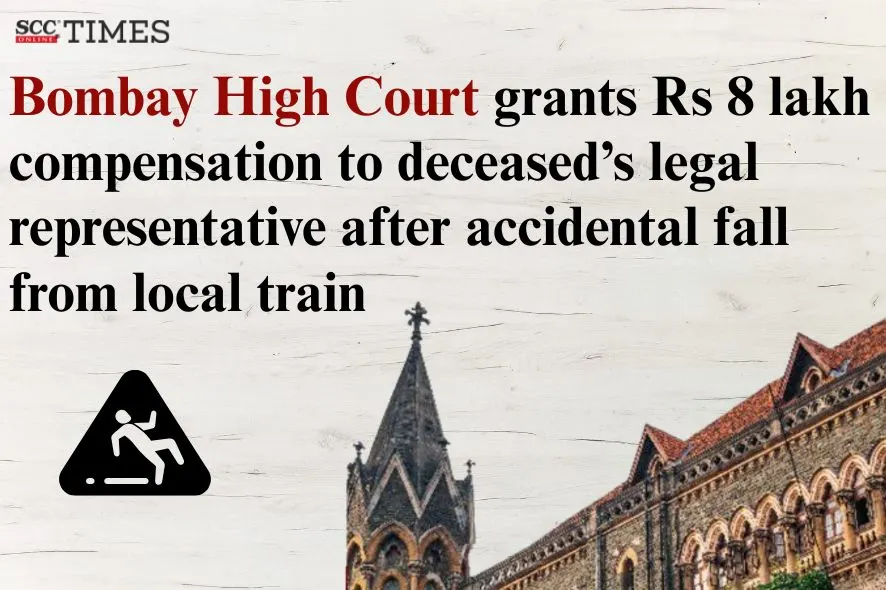Bombay High Court: An appeal was filed by the appellant under Section 23 of the Railway Claims Tribunal Act, 1987 (the ‘1987 Act’), challenging the order of the Railway Claims Tribunal (‘Tribunal’), which had rejected her and her father’s application for compensation under Section 124-A the Railways Act, 1989 (the ‘Railways Act’). A Single Judge Bench of N.J. Jamadar, J., reversed the Tribunal’s decision and held that if the claimant belonged to a class presumed dependent due to the relationship and was not required to prove actual dependency, and the railway’s strict liability was established, then the right to compensation crystallised on the date of the passenger’s death under Section 124-A of the Railways Act. The Court further held that the appellant in her capacity as the legal representative of the deceased who died after accidental fall from a local train was entitled to receive Rs 8 lakh compensation.
Background:
The deceased, a 25-year-old bachelor died on 25-7-2011, allegedly after accidently falling from a local train while travelling from Malad to Mahalaxmi Station by a local train on a valid second-class season ticket. An application was made by his father and sister before the Tribunal seeking compensation under Section 124-A of the Railways Act. However, the Tribunal dismissed the application, alleging that the circumstances did not establish an “untoward incident” and placed an onus on the applicants to prove whether deceased was a bona fide passenger at the time of the accident.
The Tribunal submitted that the applicants had failed to establish that the deceased had died due to an “untoward incident” as defined under Section 123(c)(2) of the Railways Act, since the deceased was found lying on the ‘Up Through Fast Track next to the STA line’. It was observed that he could not have fallen from a slow train that stops at Mahalaxmi Station, as slow trains operate on the slow track. The Tribunal alleged that merely because he was holding a season ticket did not necessarily justify an inference that he was travelling in the train at the time of the incident.
The Tribunal further argued that, following the death of the deceased’s father during the pendency of the application, the deceased’s sister was not entitled to claim compensation in the capacity of a legal representative of a dependent.
Analysis and Decision:
The Court observed that the primary facts of death of a passenger in an untoward incident and that such passenger was a bona fide passenger were established, the liability of the railway administration became absolute. The Court emphasised that the fact that there was no wrongful act, neglect or default on the part of the railway administration, was of no significance since the provisions of Section 124-A of the Railways Act incorporated the principle of strict liability.
The Court further observed that the Tribunal and Courts were expected to construe the expression “accidental falling” in a purposive manner and held that “accidental falling” was the linchpin of the term “untoward incident,” and that the accidental falling of any passenger from a train carrying passengers constituted an “untoward incident” within the meaning of Section 123(c)(2) of the Railways Act.
The Court relied on Union of India v. Prabhakaran Vijay Kumar, (2019) 3 SCC 572, wherein it was held that the provision for compensation in the Railways Act was a beneficial piece of legislation and it should receive a liberal and wider interpretation, and if a restrictive meaning to the expression ‘accidental falling of a passenger from a train carrying passengers’ in Section 123(c) of the Railways Act was to be adopted, it would deprive a large number of railway passengers from getting compensation in railway accidents.
The Court relied on Shri Lakhiram Manjhi v. Management of Sangramgarh Colliery, (1994) 1 SCC 292, wherein it was held that the death of the workman during the pendency of the proceeding could not deprive the heirs or legal representatives of their right to continue the proceeding and claim the benefits as successors to the deceased workman. The Court emphasised that under the provisions of Chapter XIII of the Railways Act, there was no indication that the claim application filed by the dependent under Section 125 of the Railways Act, would abate upon the death of the claimant. The Court further noted that under Rule 2(f) of the Railway Claims Tribunal (Procedure) Rules 1989, ‘legal representative’ meant a person who in law represented the estate of deceased.
The Court allowed the appeal and held that the primary facts to enforce the strict liability of the railway administration were established and the right to receive compensation crystalised as of the date of death of the deceased passenger and the fact that the Tribunal unjustifiably rejected the claim, did not defeat such crystalised or vested right in the event the dependent/claimant died after preferring an appeal.
The Court further held that the appellant in her capacity as the legal representative was entitled to prosecute the appeal and receive compensation of Rs 8 lakh which would have been paid to the father as it adopted the character of the estate of him, however she would receive the said compensation for and on behalf of all the legal representatives of the father, in a representative capacity.
[Mahadev Krishna Tambe v. Union of India, 2025 SCC OnLine Bom 2413, decided on 19-6-2025]
Advocates who appeared in this case :
For the Appellants: Mohan Rao
For the Respondent: Suresh Kumar, a/w Smita Thakur


